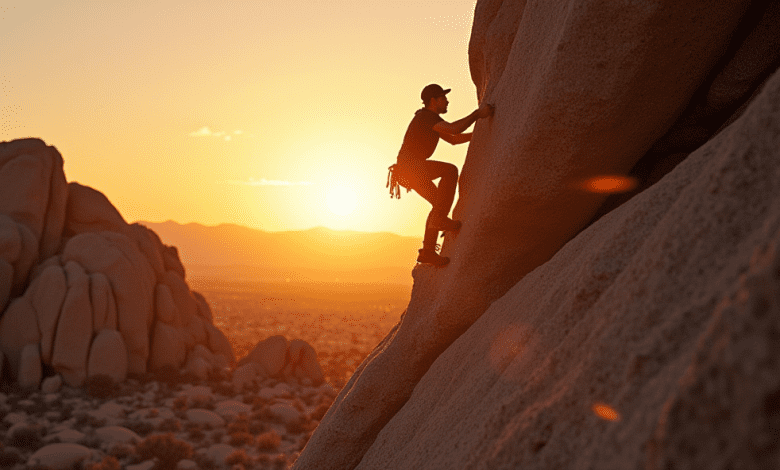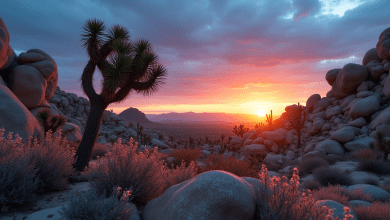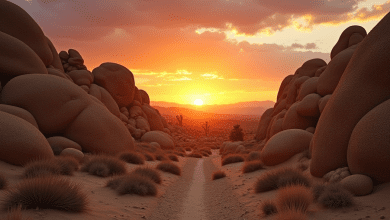Ultimate Guide to Rock Climbing Difficulty in Joshua Tree National Park: Tips, Routes, and Ratings

Understanding Rock Climbing Difficulty in Joshua Tree National Park
Joshua Tree National Park, located in southeastern California, is a mecca for rock climbing enthusiasts. Known for its stunning landscapes and unique rock formations, the park attracts climbers of all skill levels. However, understanding the difficulty levels of climbing routes here is crucial for a safe and enjoyable climbing experience. In this article, we’ll explore the climbing grades, terrain, and safety tips to help you conquer the rocks in Joshua Tree.
The Climbing Grades: What You Need to Know
Climbing difficulty is measured using several grading systems, with the French (or V) and Yosemite Decimal System (YDS) being the most common in the U.S. Joshua Tree primarily uses the YDS, which classifies climbs from Class 1 (easy hiking) to Class 5 (technical climbing). Here’s a breakdown of the key categories:
Class 1 to 4
- Class 1: Simple hiking trails, no technical climbing required.
- Class 2: Moderate hiking with some scrambling, requiring the use of hands for balance.
- Class 3: Scrambling on rocky terrain, hands may be necessary for ascent but ropes aren’t generally required.
- Class 4: Technical climbing, with the possibility of falling, usually requires protective gear, though no rope may be needed.
Class 5
- Class 5: This is the range where technical climbing begins. Class 5 climbing is further broken down into subcategories (5.0 to 5.15), indicating increasing difficulty levels.
Subcategory Climbing Grades
- 5.0 to 5.4: Perfect for beginners, these routes are generally easier, featuring good handholds and footholds.
- 5.5 to 5.9: Intermediate climbers will find these routes challenging yet manageable.
- 5.10 and above: For advanced climbers, routes in this range demand technique, strength, and endurance.
Popular Climbing Areas in Joshua Tree
Joshua Tree offers an array of climbing areas, each with its unique character and challenges. Here are some popular climbing spots:
Hidden Valley Campground
This area is home to the iconic “Intersection Rock,” with various routes ranging from moderate to hard. The crag’s accessibility makes it a favorite spot for climbers looking to try out their skills on different levels.
Ryan Mountain
Known for both rock climbing and hiking, Ryan Mountain provides a range of climbing opportunities. Here, you can find both easy and technical routes, all while enjoying breathtaking views of the park.
The Wonderland of Rocks
For those seeking adventure, the Wonderland of Rocks offers off-trail climbing in a labyrinth of boulders and rock formations. More experienced climbers will find challenging routes that can test their skills.
Preparing for Your Climbing Adventure
Preparation is key when venturing into the climbs of Joshua Tree. Here are some tips to ensure a successful day of climbing.
Research the Routes
Before arriving, research the routes you want to attempt. Websites like Mountain Project offer climbers detailed information about difficulty ratings, the best access points, and gear recommendations.
Bring the Right Gear
Proper gear is essential for a successful climbing day. At minimum, you should bring:
– Climbing shoes
– Harness and belay device
– Helmet
– Chalk bag
– Rope and quickdraws for sport climbing
Know Your Limits
While the thrill of rock climbing can be intoxicating, knowing your limitations is crucial for safety. Start with routes within your skill level, and gradually take on more challenging climbs as you become comfortable.
Safety Tips for Climbers
Safety should always be a top priority in rock climbing. Here are some important safety tips to keep in mind:
Climb with a Partner
Having a climbing partner not only makes the experience more enjoyable, but it also ensures that help is available in case of an emergency. It’s essential to keep an eye on each other and communicate effectively.
Check Weather Conditions
Weather in Joshua Tree can be unpredictable. Make sure to check the forecast before heading out, and be prepared for sudden changes in conditions. Avoid climbing during storms or high winds.
Respect the Environment
Joshua Tree is known for its precious ecosystems. Stay on designated trails, pack out all trash, and minimize your impact on the environment to ensure that this natural wonder remains for climbers in the future.
Conclusion
Rock climbing in Joshua Tree National Park is an exhilarating experience filled with stunning views and challenging routes. By understanding climbing difficulties, preparing properly, and following safety guidelines, you can enjoy everything this incredible park has to offer. Get your gear ready, choose your route wisely, and prepare for an adventure that you’ll cherish for years




